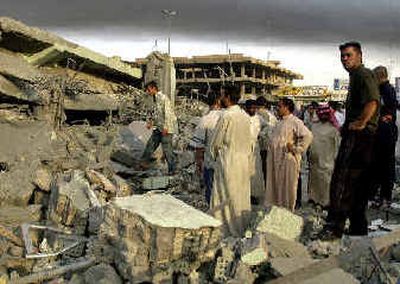U.S. troops turn up heat on insurgents

BAGHDAD, Iraq – U.S. troops went on the offensive from the gates of Baghdad to the Syrian border Tuesday, pounding Sunni insurgent positions from the air and supporting Iraqi soldiers in raids on mosques suspected of harboring extremists.
American and Iraqi forces launched the operations ahead of Ramadan, expected to start at week’s end, in an apparent attempt at preventing a repeat of the insurgent violence that took place at the start of last year’s Muslim holy month.
Clashes broke out in a string of militant strongholds from Fallujah, 40 miles west of Baghdad, northward along the Euphrates Valley to the Syrian border town of Qaim – all major conflict areas.
Some of the sharpest exchanges took place in Hit, 90 miles northwest of Baghdad, where residents and hospital officials said U.S. aircraft attacked two sites, killing two people and wounding five. The U.S. command had no comment.
U.S. helicopters fired on a mosque in Hit on Monday and set it ablaze after the military said insurgents opened fire on Marines from the sanctuary. Scattered clashes were reported overnight, killing at least two Iraqis and wounding 15, hospital official said.
Insurgents attacked an Iraqi National Guard outpost east of Qaim on Tuesday, the U.S. military said. The local hospital reported 15 to 20 people were killed.
Seventy miles west of Baghdad, Iraqi troops backed by U.S. soldiers and Marines raided seven mosques in the Sunni insurgent stronghold of Ramadi, arresting a locally prominent member of a clerical association and three other people. They also seized bomb-making materials and “insurgent propaganda” in the mosques, U.S. officials said.
In Baghdad, the Association of Muslim Scholars, a Sunni clerical group suspected of links to the insurgency, condemned the mosque raids as an example of alleged American hostility toward Islam.
“I think there is a religious ideology that drives the American troops,” said the association’s official spokesman, Mohammed Bashar al-Faydhi. “President Bush has said at the beginning of the war that this is a ‘crusade,’ ” he said, referring to Christian attacks on Muslims during the Middle Ages.
Angry Ramadi residents accused the Americans of breaking down doors and violating the sanctity of mosques.
“This cowboy behavior cannot be accepted,” said cleric Abdullah Abu Omar. “The Americans seem to have lost their senses and have gone out of control.”
The raids followed a surge in insurgent attacks in Ramadi, and the U.S. command accused the militants of violating the sanctity of the mosques by using them for military purposes. In Fallujah, the focal point for Sunni resistance, residents reported explosions and clashes on the eastern edge of the city Tuesday afternoon. At least five people were killed and four wounded in the blasts, according to Fallujah General Hospital.
The U.S. command said the clashes began when insurgents in Fallujah opened fire on troops from the 1st Marine Expeditionary Force. After the rebels began firing mortars, the Marines called in air support and a U.S. warplane “dropped a precision-guided weapon, eliminating the insurgent fire,” the military said.
The renewed activity around Fallujah followed a pair of predawn airstrikes, which the U.S. command said targeted hideouts and meeting places of the feared Tawhid and Jihad, the terrorist group responsible for numerous kidnappings and beheadings of foreign hostages.
One of the airstrikes flattened a well-known Fallujah restaurant and the other destroyed a building in another part of the city. Five people were killed and two were wounded in the two attacks, hospital officials reported.
Tuesday’s airstrikes in Fallujah were the first in four days and occurred as Iraqi officials were in talks with city representatives to restore government control, which disintegrated after the Marines ended a three-week siege in late April.
Since then, the city has fallen under the control of hard-line Islamist clerics and armed followers who defended Fallujah against the Marines. Both sides have said they were close to an agreement but that several details remain unresolved, including how Iraqi forces would enter the city.
A U.S. official, speaking on condition of anonymity, said there are concerns within the U.S. government about a possible rise in insurgent violence around Ramadan because of an upswing last year – when bombings and rocket attacks accelerated significantly in Baghdad and other areas at the beginning of the holy month.
Some militants believe they would win a special place in paradise by sacrificing their lives in a jihad, or holy war, during Ramadan, when Muslims say their sacred book the Quran was revealed to the Prophet Muhammad.